
Congratulations to Ben Morehouse @benmorehouse.bsky.social and the other 2026 Michelson Prize Awardees. All five newly funded projects are incredibly exciting areas of immunology!
www.michelsonmedicalresearch.org/news/michels...
@ortizdeora.bsky.social
Microbiologist. Wholobiontist. Molecular and Cell Biologist. Postdoc in the Wiles lab @UCIrvine. Interested in illuminating the invisible connections of the gut microbiome within cross-kingdom interactions.

Congratulations to Ben Morehouse @benmorehouse.bsky.social and the other 2026 Michelson Prize Awardees. All five newly funded projects are incredibly exciting areas of immunology!
www.michelsonmedicalresearch.org/news/michels...
When viral infection is not an excuse to stop moving!
01.02.2026 04:37 — 👍 1 🔁 0 💬 0 📌 0
Now published in PLoS Pathogens! #microsky #phagesky
journals.plos.org/plospathogen...

A prophage-encoded sRNA limits phage infection of adherent-invasive E. coli
#PLoSPathogen from @prsecor.bsky.social
journals.plos.org/plospathogen...

Sometimes the tick rectal sac looks astral
29.12.2025 19:02 — 👍 2 🔁 0 💬 0 📌 0What a beautiful paper! Congrats!!
23.12.2025 04:41 — 👍 1 🔁 0 💬 1 📌 0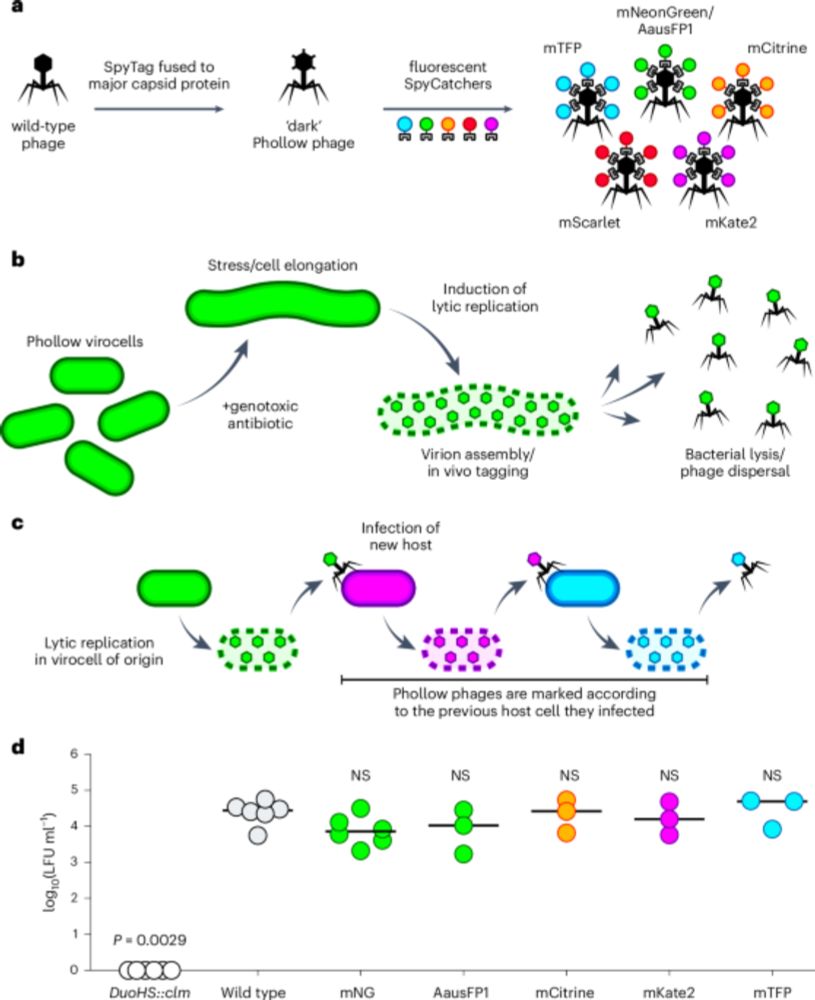
Live microscopy to 'phollow' phage outbreaks 🔬✳️
www.nature.com/articles/s41...
As the year ends, we decided to select our favorite papers of 2025
Turns out, it is impossible as we love them all!
So, we picked 'some' that exhibit the range of microbiology highlighted through the columns of Nature Microbiology.
Here is a glimpse into #EditorPicks of 2025
#MicroSky 🦠
Oh sorry, I am at MSU in the Secor lab.
24.08.2025 14:09 — 👍 1 🔁 0 💬 1 📌 0Any in-person slots ?
24.08.2025 04:38 — 👍 0 🔁 0 💬 1 📌 0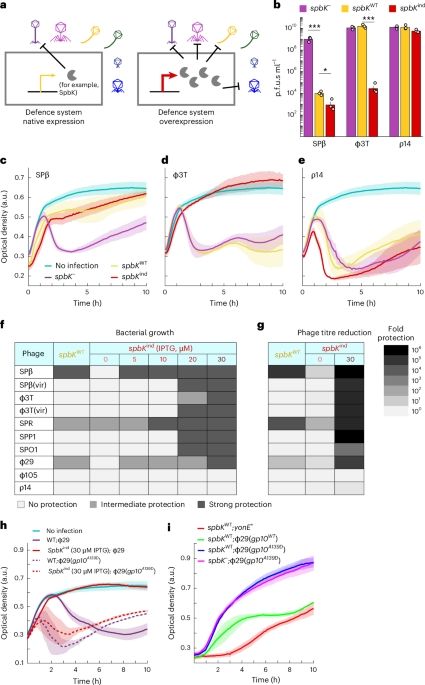
Expression level of anti-phage defence systems controls a trade-off between protection range and autoimmunity
By Nitzan Aframian and Avigdor Eldar.
www.nature.com/articles/s41...

1/16 New pre-print from the Sternberg Lab!
We uncover how temperate phages can use RNA-guided transcription factors to remodel the flagellar composition of their bacterial host and enhance their fitness.
Find the preprint and full story here: tinyurl.com/mshwjd77



We took the day off from the lab and spent all day in Paradise Valley, Montana on the Yellowstone River
25.07.2025 01:36 — 👍 12 🔁 2 💬 0 📌 0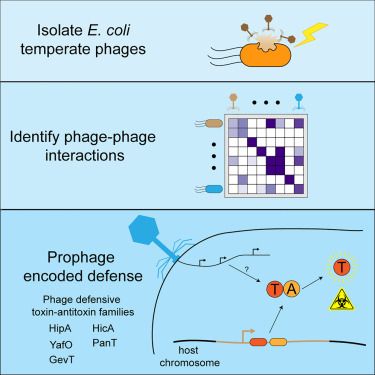
E. coli prophages encode an arsenal of defense systems to protect against temperate phages: Cell Host & Microbe www.cell.com/cell-host-mi...
01.06.2025 15:21 — 👍 44 🔁 19 💬 2 📌 1🤯
07.05.2025 14:38 — 👍 2 🔁 0 💬 0 📌 0We’re thrilled to be featured on the May cover of Nature Microbiology... And our Research Briefing is out now—check it out, it’s 🔥! www.nature.com/articles/s41...
06.05.2025 19:17 — 👍 41 🔁 14 💬 0 📌 1Congrats!!! That's so awesome 🚀
29.04.2025 23:29 — 👍 1 🔁 0 💬 0 📌 0
🚨OUT NOW 🚨
Phollow Reveals In Situ Phage Transmission Dynamics in the Zebrafish Gut Microbiome at Single-Virion Resolution 🦠🐟
#MicroSky #MicrobiomeSky
www.nature.com/articles/s41...
Thank you!
23.04.2025 16:10 — 👍 0 🔁 0 💬 0 📌 0Thank you. So nice to hear from you!
20.04.2025 18:05 — 👍 1 🔁 0 💬 0 📌 0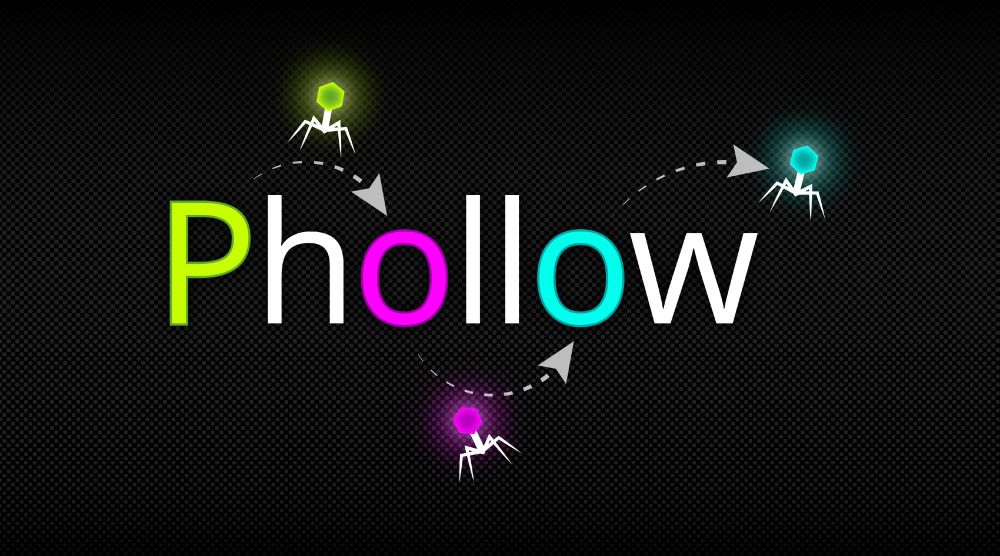
Phollow provides a platform to unravel the hidden lives of phages, capturing their nanoscopic dynamics within microscopic bacterial communities and macroscopic animal hosts. Check all the details in our manuscript!
18.04.2025 18:38 — 👍 4 🔁 0 💬 0 📌 0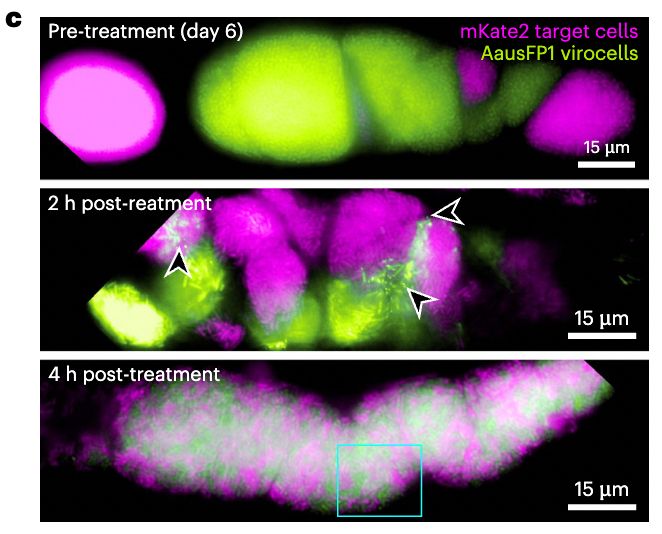
We also found that antibiotics induce phage outbreaks and viral transmission that ultimately remodels the composition of gut microbial communities.
18.04.2025 18:38 — 👍 6 🔁 0 💬 1 📌 0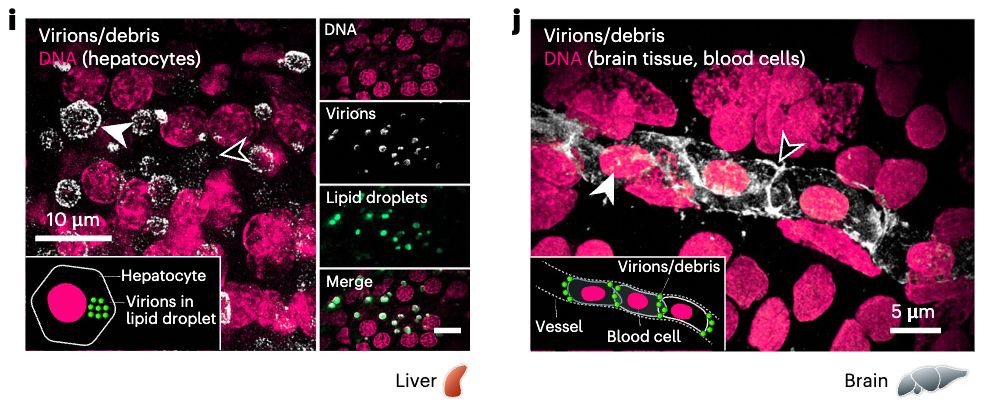
and more strikingly, virions disseminating to extraintestinal tissues including the liver and brain. magenta = DNA, white= phage particles.
18.04.2025 18:38 — 👍 2 🔁 0 💬 1 📌 0phages (in white) being internalized by gut-lining cells, including enteroendocrine cells (in green). pink = nuclei of intestinal tissues.
18.04.2025 18:38 — 👍 3 🔁 0 💬 1 📌 0virions closely associating with the intestinal mucosa and tissue...
18.04.2025 18:38 — 👍 4 🔁 0 💬 2 📌 0The following videos reveals the aftermath of a phage outbreak: virions dispersed throughout the lumen...
18.04.2025 18:38 — 👍 6 🔁 1 💬 1 📌 1We then brought Phollow into the gut of live zebrafish, taking advantage of their transparency and small size to visualize microbial communities across the entire intestine —capturing their dynamic interactions with the host in real time! pink = DNA, purple = actin, green = E. coli
18.04.2025 18:38 — 👍 3 🔁 1 💬 1 📌 0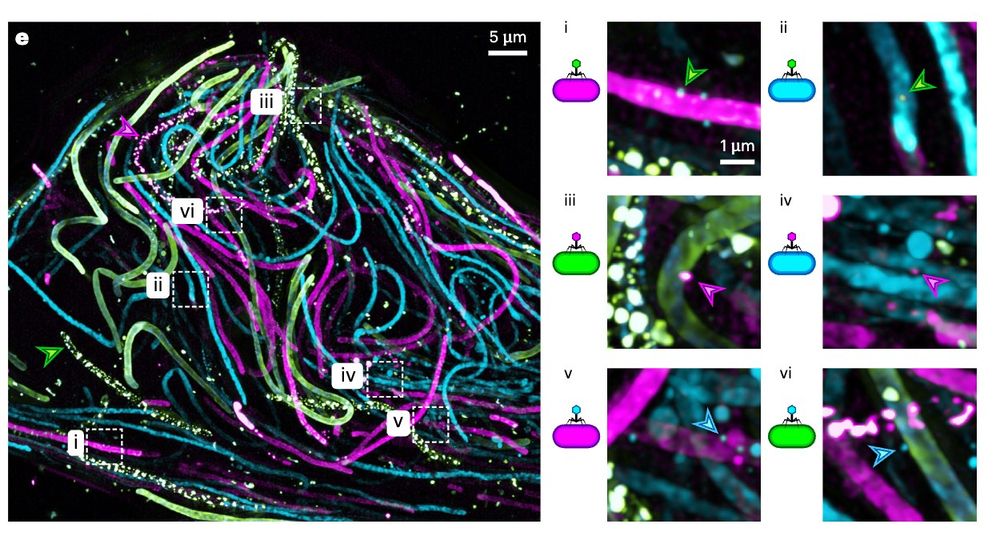
Phollow enables tracking chains of interbacterial transmission. As phages infect new bacterial hosts, they’re re-tagged with a new fluorescent color. Here, green virions from green-labeled cells infect pink- and cyan-labeled targets, generating vibrant confetti bursts of differently colored phages.
18.04.2025 18:38 — 👍 5 🔁 0 💬 1 📌 0One of my favorite experiments with Phollow are time lapses that allow us to illuminate the secret lives of phages. Here, we captured P2 temperate phages undergoing lytic replication in E. coli, leading to explosive host cell lysis and rapid virion dispersal into the environment.
18.04.2025 18:38 — 👍 6 🔁 0 💬 1 📌 0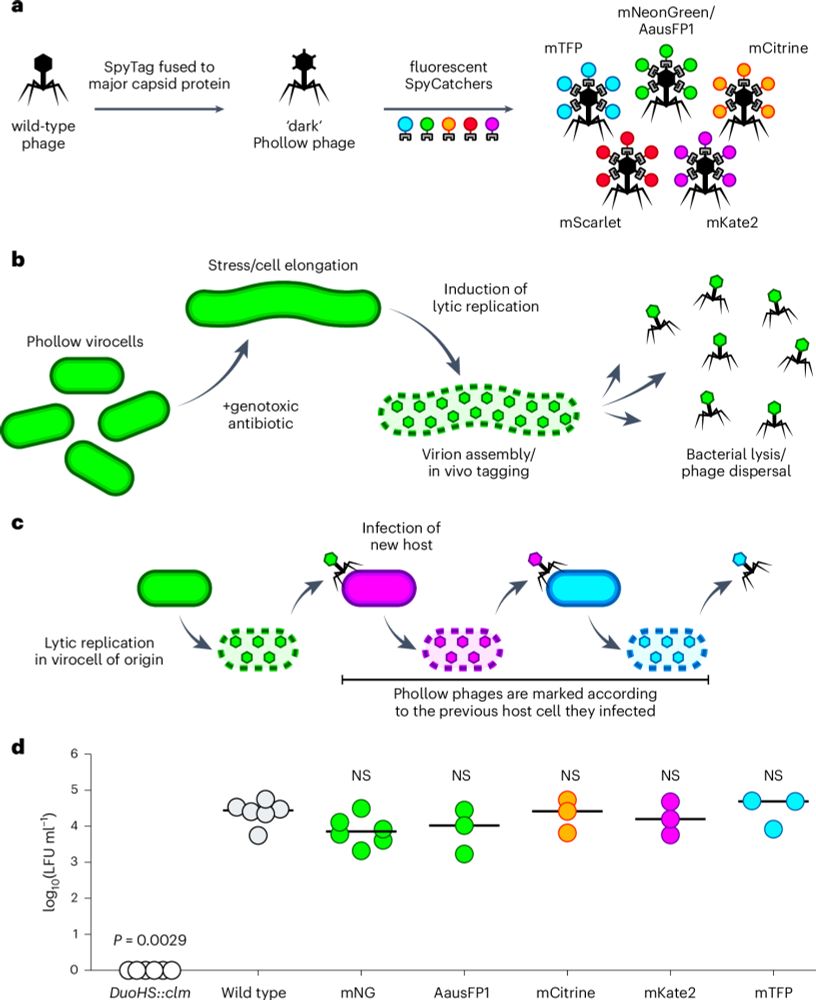
I am thrilled to share the first manuscript from the Wiles lab! We present "Phollow", an in vivo phage-tagging approach that enables direct observation of phage outbreaks with single-virion resolution by live imaging. Here some highlights 👇 www.nature.com/articles/s41...
18.04.2025 18:38 — 👍 105 🔁 39 💬 5 📌 4